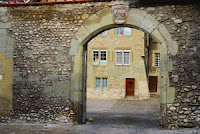The Kingdom’s Gatekeepers
By Jenny Williams
September 2, 2009
 James 2:1-10, 11-17; Proverbs 22:1-2, 8-9, 22-23
James 2:1-10, 11-17; Proverbs 22:1-2, 8-9, 22-23Ouch. James must have been visiting churches in North America, where in addition to race, the other great divider on Sunday morning is class. He upbraids the congregation for gatekeeping by the way they treat visitors at their worship services. They give preferential treatment to rich visitors and fling spiritual platitudes toward poor visitors. “We’ll pray for you,” we good Christians say, without much regard to which of their physical needs we can meet.
After working last fall in a small village in the West Bank, I became friends with a Melkite Palestinian priest there. I was surprised to discover he held many of the convictions shared by we Ekklesia Project folk: beliefs that liturgy forms us, that liturgy should take us outside the four walls of the church, that we ought to stand in solidarity with the poor.
He once expressed his skepticism of the church hierarchy. He said, “I do not like the Bishops in general because they do not daily meet with the poor. They see the world secretly from behind dark glass.” When bishops visited the villages, he explained, they were chauffeured in limos with tinted windows, and never got out of the car to interact with the townspeople.
By North American standards, this Palestinian priest is poor. Out of his monthly salary of US$1000, he is to support his family of six as well as meet needs of people in the community. He does amazing work in his village, working with Christians and Muslims alike. He runs programs for children and youth in the summer, assists people with medical expenses, and buys olives from farmers whose livelihoods are now diminished because of the separation barrier erected by the Israeli military. The olives go into a soap sold by his church to raise funds to send children to school.
In her lecture at this year’s Gathering, Kathy Grieb cited statistics which showed that people with less income are more generous supporters of churches and charities than people with more income.
A clergy friend told me a story about a middle-class church that began a food pantry and eventually added a clothing closet. Some of the clients who patronized the pantry and closet eventually ended up volunteering with those ministries as a way to give back the help that had been given to them. Such was the case with Sally, one of the pantry’s original patrons who became one of their regular volunteers.
One day when Sally was working at the food pantry, a destitute woman came into the clothes closet. Her trailer had burned down, and she didn’t have anything. The church members were able to quickly help her with what she needed, with the exception of shoes, because they didn’t have any at the time. They scurried around wondering aloud what they could do about the shoes, asking questions of each other like “Does anyone know of anybody who is planning to donate some shoes but just hasn’t brought them in yet?” and “I wonder if one of the merchants in town would be willing to donate a pair of shoes?” Sally walked into the room, discovered what was going on, and asked the client what size shoes she needed. “Seven-and-a-half,” the woman replied. Sally took off her own shoes, handed them to the woman, and said, “Here. We wear the same size.” She, who did not have much at all, gave the shoes off her feet.
Perhaps our upper- or middle-class churches could learn from Sally or the priest. What we have is not really ours. We servants just care for things for a time while the master is away, and we’re supposed to care for them in a way that pleases our Master.
Fall is upon us—a time when Stewardship Campaigns rear their ugly heads. Perhaps this text can push us beyond the kind of stewardship that has us write checks to our churches, and toward a kind of stewardship that asks us to give up our shoes to people who need them. Coming face to face with someone in need and trying to meet that need in a way that maintains the other person’s dignity is difficult. It involves a relationship. It’s easier to donate money or canned food to an organization, which keeps us a safe distance from the messy realities of the lives of our neighbors.
In this area of our discipleship, we tend toward the wide gate. The path is easy, but it leads to destruction. The challenge is to enter the narrow gate, which has a hard road but it leads to life. Perhaps only few can find this gate because the poor are standing around it, and we’d rather not walk near them. “Do not rob the poor because they are poor, or crush the afflicted at the gate; for the Lord pleads their cause and despoils of life those who despoil them.” (Proverbs 22:22-23).
If we avoid people in need and instead choose the wide gate, the easy road will lead to not only our own destruction, but to the destruction of the neglected ones who are gathered around the narrow gate to the Kingdom.